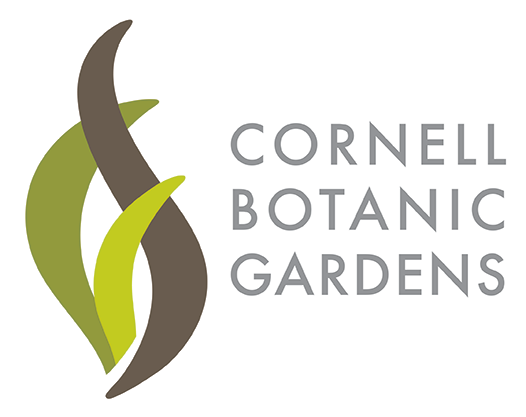News
Cornell Botanic Gardens, University, and City Collaborate to Improve Gorge Safety
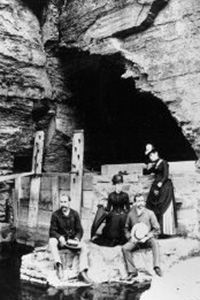 With the support of Cornell Botanic Gardens and Cornell University, the City of Ithaca Common Council in December voted to permit erection of a safety barrier over the 19th-century industrial relic known as “Ezra’s Tunnel.” While never intended to serve as a public access point, the former sluiceway provided unauthorized ingress to the city-owned area of Fall Creek Gorge at the top of Ithaca Falls and to nearby waterfalls and plunge pools that are among the most dangerous in the Finger Lakes.
With the support of Cornell Botanic Gardens and Cornell University, the City of Ithaca Common Council in December voted to permit erection of a safety barrier over the 19th-century industrial relic known as “Ezra’s Tunnel.” While never intended to serve as a public access point, the former sluiceway provided unauthorized ingress to the city-owned area of Fall Creek Gorge at the top of Ithaca Falls and to nearby waterfalls and plunge pools that are among the most dangerous in the Finger Lakes.
The barrier was designed, funded, and constructed by Cornell University, then ownership turned over to the city of Ithaca in January 2018.
Closing Ezra’s Tunnel is part of a broader strategy that the Cornell Gorge Safety Committee, which includes city representation, has been working on to promote safe and responsible use of the gorges. The Nathaniel Rand ’12 Memorial Gorge Safety Education Program is named in memory of a student who died in a gorge drowning accident in 2011. The program’s goal is to prevent future tragedies by informing visitors about safe and responsible use of the gorges.
The program includes educational initiatives such as the gorge stewards, orientation hikes for new students, educational programming for orientation leaders and residence advisors, and a gorge safety video and brochure (pdf). These educational efforts are just one part of a comprehensive safety program that includes providing safe recreational alternatives, enforcement, and maintenance of gorge infrastructure.
For more, see these articles in the Cornell Chronicle, New York Times, and Cornell Daily Sun.
Now is the time to visit 30,000 new spring bulbs
 The machine used was donated from a large bulb supplier in the Netherlands to Professor Miller's flower bulb research program. The machine lifts the turf, plants the bulbs, and places the turf immediately back in place. A video of the planting next to the Bioswale Garden can be found here.
The machine used was donated from a large bulb supplier in the Netherlands to Professor Miller's flower bulb research program. The machine lifts the turf, plants the bulbs, and places the turf immediately back in place. A video of the planting next to the Bioswale Garden can be found here.Bulbs were donated from Professor Miller's connections in Holland and from David Strabo, Cornell Class of ’80, of Longfield Gardens. Irene Lekstutis, Botanic Gardens’ landscape designer, crafted the planting designs and our horticultural staff sorted and packed the bulbs into the machine. Bulbs were selected for their deer resistance and to showcase a sequence of blooms from throughout the spring.
These bulbs are emerging now and will continue to bloom through June.
 In early spring, Chionodoxa luciliae (blue in color) will emerge in three circles in Jackson Grove (Arboretum). To aid the planting machine in making the tight circular curves, Horticulturist Melissa Cox used a sod-cutter to carve out the design. Chionodoxa bulbs naturalize, meaning that as they multiply the circles will become fuller. A mix of 4 varieties of daffodils, Chionodoxa 'Gigantea', Crocus vernus, Camassia quamash and Allium 'Purple Sensation' were planted along the lawn side of our Bioswale Garden outside the Nevin Welcome Center (shown left). Look for these to bloom in mid spring. An early summer display of Allium 'Purple Sensation', A. atropurpureum, A. nigrum, and A. sphaerocephalum will flank the mown path in Newman Meadow near the entrance to the Arboretum at Caldwell Drive between the Nut Tree Collection and Slim Jim Woods.
In early spring, Chionodoxa luciliae (blue in color) will emerge in three circles in Jackson Grove (Arboretum). To aid the planting machine in making the tight circular curves, Horticulturist Melissa Cox used a sod-cutter to carve out the design. Chionodoxa bulbs naturalize, meaning that as they multiply the circles will become fuller. A mix of 4 varieties of daffodils, Chionodoxa 'Gigantea', Crocus vernus, Camassia quamash and Allium 'Purple Sensation' were planted along the lawn side of our Bioswale Garden outside the Nevin Welcome Center (shown left). Look for these to bloom in mid spring. An early summer display of Allium 'Purple Sensation', A. atropurpureum, A. nigrum, and A. sphaerocephalum will flank the mown path in Newman Meadow near the entrance to the Arboretum at Caldwell Drive between the Nut Tree Collection and Slim Jim Woods.Naturally dyed textiles on display in the Nevin Welcome Center
Read more about the students and their work in the February 12 Cornell Chronicle article, "To dye fore: Exhibit showcases naturally tinted textiles." (Photo by Jason Koski, University Photography)
Chocolatada! An "Ithaca Loves Teachers" Event, February 20
Date/time: Tuesday, February 20; Drop in any time between 1 p.m. and 4 p.m.
Cost: $10 per person; pre-registration not required
Location: Nevin Welcome Center
Ithaca Loves Teachers! This program is one of many events offered February 16 -25 to celebrate educators with entertainment, activities, family fun, and discounts throughout the Tompkins County community. Click here to view the lineup of events.
Land Gift Provides Legacy for Old-Growth Forest Natural Area
With Bandler Family Forest Tract, the area now preserves more than 100 acres, with almost 30 acres of old-growth forest. Read more in the February 8 Cornell Chronicle article "Land gift expands old-growth forest natural area."
How do plants survive winter? Find out on our upcoming winter plant walks
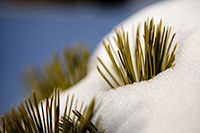 Winter is a time of survival for plants in temperate zones, yet a variety of ingenious adaptations allow plants to survive the harsh season and resume their life processes anew each spring. Join plant science professor emeritus Dr. Peter Davies for a walk through the botanic gardens to learn the science behind winter plant survival strategies. Please dress appropriately for weather conditions. Walk will be cancelled if temperatures are below 20 degrees F.
Winter is a time of survival for plants in temperate zones, yet a variety of ingenious adaptations allow plants to survive the harsh season and resume their life processes anew each spring. Join plant science professor emeritus Dr. Peter Davies for a walk through the botanic gardens to learn the science behind winter plant survival strategies. Please dress appropriately for weather conditions. Walk will be cancelled if temperatures are below 20 degrees F.Pre-registration is not required.
Dates/times: Thursday, February 22; 1 p.m. to 2 p.m and Saturday, February 24; 2 p.m. to 3 p.m.
Cost: $5 suggested donation; pre-registration is not required
Location: Meet at the Nevin Welcome Center
Earthwise: A Storytelling Journey Featuring Regi Carpenter
 Stories have been used throughout history to teach important life lessons, preserve cultural heritage, and encourage respect for each other and the natural world. In this engaging and participatory program, storytellers Regi Carpenter and Kevin Moss will share a sampling of earth wisdom stories, drawing on a variety of oral and folk traditions.
Stories have been used throughout history to teach important life lessons, preserve cultural heritage, and encourage respect for each other and the natural world. In this engaging and participatory program, storytellers Regi Carpenter and Kevin Moss will share a sampling of earth wisdom stories, drawing on a variety of oral and folk traditions. Date/time: Saturday, February 17; 1 p.m. to 2 p.m.
Cost: $5 suggested donation; no registration required
Location: Nevin Welcome Center
Appropriate for adults and children over 5 years.
Summer Internship Applications are due February 20
Become a member of the botanic gardens' professional team and learn about the operations of a public garden. We are accepting applications for positions working with staff in our botanic gardens, natural areas, and education department. Learn more on our internship page.
Opening reception for "Quiet Labor" exhibit, February 7
 Creating textiles from natural dyes is a laborious process involving cultivation, harvest, textile preparation, and dye extraction. Cornell Professor Denise Green and students in her Natural Dye Studio course designed textiles in brilliant hues of yellows, reds, greens, blues, purples, and more. These naturally dyed textiles made from a range of plants, including marigold, sunflower, and Japanese indigo are on display through June 2018.
Creating textiles from natural dyes is a laborious process involving cultivation, harvest, textile preparation, and dye extraction. Cornell Professor Denise Green and students in her Natural Dye Studio course designed textiles in brilliant hues of yellows, reds, greens, blues, purples, and more. These naturally dyed textiles made from a range of plants, including marigold, sunflower, and Japanese indigo are on display through June 2018. Opening Reception: Meet professor Denise Green and students who will share the various techniques used to create the pieces in this exhibit. Light refreshments will be served.
Date/time: Wednesday, February 7; 5 p.m. to 7 p.m.
Cost: Free and open to the public.
Location: Nevin Welcome Center
Cornell artists win global soil competition
The soil-painting team, led by Kirsten Kurtz, included our Emily Dietrich, horticulturist and artist. The painting won first prize in the university category of a global soil painting competition sponsored by the Food and Agriculture Organization of the United Nations. Read more in a January 16 Cornell Chronicle.
Christopher Dunn to chair new national conservation group
Cornell Botanic Gardens’ director is leading the U.S. National Committee of the International Union for the Conservation of Nature. Read more about his role in a January 16 Cornell Chronicle article.
Animal track and sign walk February 3
 Join local author and animal tracker Linda Spielman for a leisurely walk through the Mundy Wildflower Garden in search of animal tracks and other signs of wildlife. Even if there’s no snow nature will offer plenty of stories for us to interpret. After the walk Linda will sign copies of her book, A Field Guide to Tracking Mammals of the Northeast, available for purchase in our Garden Gift Shop. Appropriate for adults and children over 8 years. Please dress appropriately for the weather.
Join local author and animal tracker Linda Spielman for a leisurely walk through the Mundy Wildflower Garden in search of animal tracks and other signs of wildlife. Even if there’s no snow nature will offer plenty of stories for us to interpret. After the walk Linda will sign copies of her book, A Field Guide to Tracking Mammals of the Northeast, available for purchase in our Garden Gift Shop. Appropriate for adults and children over 8 years. Please dress appropriately for the weather.Date/time: Saturday, February 3; 1 p.m. to 3 p.m.
Cost: $5 suggested donation; no registration is required
Instructor: Linda Spielman, local author and animal tracker
Location: Meet at the Nevin Welcome Center
Guided tour with conifer gardener Phil Syphrit February 2
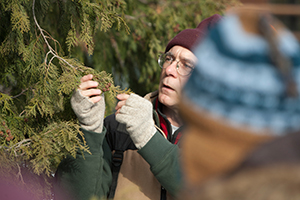 Join conifer gardener Phil Syphrit on an easy walk through part of our conifer collection. The tour will highlight conifers, both native and non-native to the Ithaca area (including yew, metasequoia, concolor fir, larch, and cedar), their unique features, and tips for their care in the home landscape. The walk will last approximately one hour. Please dress appropriately for the weather.
Join conifer gardener Phil Syphrit on an easy walk through part of our conifer collection. The tour will highlight conifers, both native and non-native to the Ithaca area (including yew, metasequoia, concolor fir, larch, and cedar), their unique features, and tips for their care in the home landscape. The walk will last approximately one hour. Please dress appropriately for the weather. Date/time: Friday, February 2; noon - 1 p.m
Cost: $5 suggested donation; no registration required
Instructor: Phil Syphrit, conifer gardener
Location: Meet at the Nevin Welcome Center
Learn how Cornell's Climate-Adapted Design Studio has helped communites adapt to climate change
 his Biophilia: ITHACA forum for a lively presentation and
discussion by Josh Cerra, Cornell Landscape Architecture Associate
Professor.
his Biophilia: ITHACA forum for a lively presentation and
discussion by Josh Cerra, Cornell Landscape Architecture Associate
Professor. The Climate-Adaptive Design (CAD) Studio links Cornell University students with Hudson riverfront communities faced with extreme precipitation, flooding and sea level rise to explore design alternatives for more climate-adapted and connected waterfront areas. Cerra will introduce concepts of resilience, and share the studio’s process for inspiring awareness and action in preparation for a changing climate.
Date/time: Wednesday, January 24; 5 to 6:30 p.m.
Cost: Free and open to the public
Location: Tompkins County Public Library
What is Biophilia: ITHACA?
Biophilia is the human affinity for interacting with nature. The term “biophilia,” which literally means “love of life,” was coined by social psychologist Erich Fromm and popularized by biologist E.O. Wilson.
Biophilia: ITHACA is modeled after the Biophilia: PITTSBURGH which is a “pilot chapter for a global Biophilia Network of
creative minds dedicated to strengthening the bond between people and
the natural world through education, discussion and action.”
Our Mission:
To strengthen human connections to nature and to advocate for policies
and practices that benefit the local natural environment.
Our Goals:
•
To create a supportive and inclusive network that fosters collaboration
and learning about biophilia among people with diverse backgrounds and
viewpoints
• To welcome and inspire others with the concept of biophilia
•
To explore new approaches to strengthening human connections to nature
and to discuss their application to our local community
• To use
our collective voice to advocate for and to assist in the implementation
of policies and practices that benefit the natural environment
Free
and open to all. Refreshments will be provided. This forum is sponsored by the Paleontological Research Institution, and the biophilia:ITHACA chapter is
comprised of numerous individuals and organizations including Cornell Botanic Gardens.
Our mission
is to strengthen human connection to nature. All are invited to attend
this forum and become active with biophilia: ITHACA. Contact [email protected] or [email protected] for more information.
Holiday Break Hours for the Nevin Welcome Center
Our grounds are open and free to all from dawn to dusk every day. The Nevin Welcome Center and Garden Gift Shop is closed from Sunday, December 24, 2017 through Wednesday, January 3, 2018.
Closing the Arboretum to Protect our Trees
Pedestrians are welcome to explore the arboretum every day from dawnto dusk. Vehicle access resumes in spring.
Rhoda Maurer, director of horticulture for Cornell Botanic Gardens, explains why the F. R. Newman Arboretum is closed to traffic during the winter months:
Why is the F. R. Newman Arboretum closed to vehicles during the winter?
Cornell Botanic Gardens and Cornell University do not plow or treat the roads in the arboretum. We have chosen to practice environmental stewardship by not using salts to treat slippery surfaces. Road salts carry a high environmental cost, as they contaminate water supplies and burn the roots of nearby plants. Our collections are a living museum, and safekeeping them is part of our responsibility to future generations.
Can’t you find a way to keep the roads clear that won’t damage the trees?
Keeping the roads clear without using salts limits us to physical labor and resources not available to us.
What about winter days when there’s no snow on the roads—can’t you open the gates then?
Seasonal closure of the Arboretum is necessary to ensure the safety of our guests. And while some roads may seem clear of frozen precipitation, others in the shaded hills often are not.
How do you decide when to close the gates and open them again in the spring?
Opening and closing of the Arboretum for the winter is based on current weather trends and the probability for below-freezing temperatures and precipitation patterns. Given the complexity of changing climate and weather events, we strive to keep the Arboretum open for as much of the year as possible, while also providing for the safety of our visitors.
The Joy of Living Christmas Trees
 Holiday tree selection and the search for the perfect one is upon us. Here are a few helpful hints to guide you on your quest:
Holiday tree selection and the search for the perfect one is upon us. Here are a few helpful hints to guide you on your quest:Trees cut and hanging at the Christmas tree lot all seem acceptable. What to do? Easy... simply pinch off a few needles, crush and smell. The aroma should be pleasing. Next, with your hand, tap a couple branches at midpoint and observe how many needles fall. If many fall, decline the tree, as it has been cut for too long. If a few fall, that’s OK.
Lastly, gently bend a few branches with your hand. They should be flexible in all directions, yet firm enough to hold the decorations. Clean cut the trunk base at home and immediately submerse in water. Keep water level high as long as you keep the tree. Turn lights off at night, to conserve electricity and reduce fire hazard.
Now, instead of an acceptable tree, how about the perfect one? Purchase a living tree! Choose a species that grows naturally in your area. Here in the Northeast U.S., we favor blue spruce and fir varieties, such as Frasier and Douglas. Place on top of waterproof material, wrap root ball in decorative cloth, and water frequently. Indoor air is much drier and will increase transpiration rates. You will need to water often to keep the substrate moist.
Once the tree has served its decorative, indoor purpose, place it in a cold (approximately 40 degrees F), non-temperature- controlled space. Cover root ball with mulch, blankets, or similar material to protect it from drastic temperature fluctuations.
Schedule a late winter/early spring family planting day and plant your Christmas tree. Not only do will you add another tree to the earth, you’ll enjoy its benefits for generations. Plus, each tree planted represents that season’s holiday and all its memories, forever expressed in the majestic crown of the tree YOU planted.
Lee Dean is lead arborist for Cornell Botanic Gardens
Click here to view a three-minute interview with Lee created by intern Diana Buckley.
Cascadilla Gorge is closed until spring
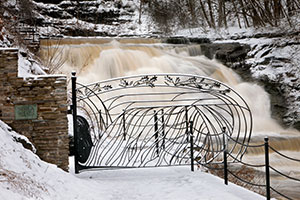 The Cascadilla Gorge Trail from Downtown to College Avenue is now closed for winter season. The trail is closed due to hazardous conditions in winter and falling rock that create unsafe conditions. The trail will re-open in the spring when conditions allow.
The Cascadilla Gorge Trail from Downtown to College Avenue is now closed for winter season. The trail is closed due to hazardous conditions in winter and falling rock that create unsafe conditions. The trail will re-open in the spring when conditions allow.Although the gorge is closed, you can tour it virtually using Google's Street View feature. Click here for a 360 degree view in front of one of the gorge's waterfalls. To view more points in the gorge, click on the yellow “pegman” in the bottom right corner and drag it to a point on the trail.
Hike on the Cayuga Trail
 The Cayuga Trail passes through many areas of Cornell Botanic Gardens
near the Cornell campus including the F. R. Newman Arboretum, Fall Creek
Natural Area, Mundy Wildflower Garden, Beebe Lake, and Fall Creek
Gorge. Join the Cayuga Trails club for a five-mile hike on Thursday,
December 14 at 9 a.m.
The Cayuga Trail passes through many areas of Cornell Botanic Gardens
near the Cornell campus including the F. R. Newman Arboretum, Fall Creek
Natural Area, Mundy Wildflower Garden, Beebe Lake, and Fall Creek
Gorge. Join the Cayuga Trails club for a five-mile hike on Thursday,
December 14 at 9 a.m.Meet at the parking lot at the Mundy Wildflower Garden off of Caldwell Road.
Click here for the full event description.
Above: Stevenson Footbridge in the Fall Creek Natural Area. Photo by Jay Potter
Winter Solstice Garden Tour December 21
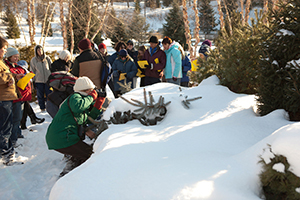 As the sun sinks towards its lowest arc in the sky and the longest night of the year (December 21), come join plant science professor Peter Davies and horticulturist Emily Pratt for a look at the plants of the Mullestein Family Winter Garden. Learn how plants cope with winter’s cold, and enjoy some seasonal plant lore. After the walk, savor some hot wassail in the warmth of the Nevin Welcome Center and do some holiday shopping in our Gift Shop.
As the sun sinks towards its lowest arc in the sky and the longest night of the year (December 21), come join plant science professor Peter Davies and horticulturist Emily Pratt for a look at the plants of the Mullestein Family Winter Garden. Learn how plants cope with winter’s cold, and enjoy some seasonal plant lore. After the walk, savor some hot wassail in the warmth of the Nevin Welcome Center and do some holiday shopping in our Gift Shop.
Date/time: Thursday, December 21; noon to 1 p.m.
Cost: $5 suggested donation; pre-registration not required
Instructors: Emily Pratt, staff horticulturist and Peter Davies, professor emeritus of plant science
Location: Nevin Welcome Center
Questions? Call 607-255-2400



